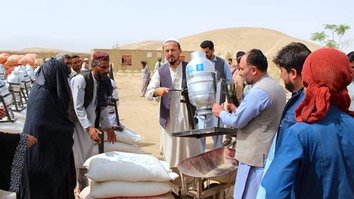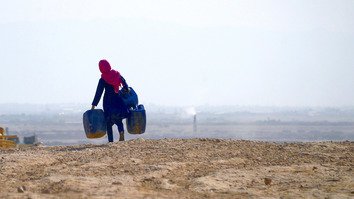KUNDUZ -- The United Nations Food and Agriculture Organisation (FAO) has partnered with the Organisation for Relief Development (ORD) in Kunduz province to provide livestock feed and agricultural products to thousands of livestock owners in the province.
The aid is meant to help them overcome the losses they incurred from natural disasters.
The aid package, which provides farmers with fodder and clover seeds to improve and increase production, is distributed among farmers affected by natural disasters, especially by the recent drought, said Rahimullah Khurami, ORD director in Kunduz.
"The aid package was distributed in the provincial capital among 2,941 livestock owners from the provincial center and Aliabad and Dasht-i-Archi districts on January 4. The assistance will help increase the livestock owners' production," Khurami told Salaam Times.
![Livestock owners receive aid packages from donors in Kunduz city January 4. [Courtesy of Obaidullah Ahmadi]](/cnmi_st/images/2023/01/13/40272-a__1_-585_329.jpg)
Livestock owners receive aid packages from donors in Kunduz city January 4. [Courtesy of Obaidullah Ahmadi]
"We provided each livestock owner 150kg of animal fodder, 5kg of clover seeds and other agricultural assistance free of charge," he said.
"We decided to provide this assistance following a careful assessment of livestock owners in Kunduz province, in light of the existing challenges in the animal husbandry sector," he said on January 6.
"The items distributed today are of high quality and will enable livestock owners to increase dairy products from their livestock and recover the losses they have suffered."
Crippling losses
Most Kunduz livestock owners say they have not been able to appropriately tend to their livestock and had to sell some at half-price to protect their remaining livestock in light of droughts, animal diseases and economic challenges in recent years.
"Unfortunately, we have continuously suffered losses in the last four years from drought. Our pastures have dried up, and livestock owners have not received any assistance," said Mohammad Asghar, 44, a livestock owner in Aliabad district.
"For the survival of their livestock, they had to sell some of their animals at half-price to buy fodder for the remaining livestock," he added.
"If the situation of animal husbandry remains as it is, many livestock owners will leave the sector," he said.
"Every year we face many problems in the summer from drought, and in the winter from snow and cold. Now we are very concerned about losing our livestock in the cold winter," Abdullah, 63, a Dasht-i-Archi district resident who goes by one name and owns 50 sheep, said.
"I sold five sheep for very little in December and used that money to buy dry bread, hay and other fodder for the remainder of my sheep," he said on January 8.
"If I had not sold those sheep, I would have lost more sheep to cold and hunger."
"Two months ago, the price of a sheep was 7,000–8,000 AFN ($78–$89), but now it is 4,000-4,500 AFN ($44–$50), since livestock owners have to sell them to get some cash," he told Salaam Times.
Hope for future
Livestock owners in Kunduz are hopeful that the FAO assistance will help increase production and make up for previous years' losses.
"This aid package is sufficient for three months for my livestock. Now I can continue animal husbandry and increase my dairy production," said Sediqullah, 51, a farmer in the Dasht-i-Qandahari area who received four sacks of animal feed and 5kg of clover seeds for free.
"This assistance was distributed at a very critical time when livestock owners were in a very tough economic situation," he said. "With this aid package, the loss of animals will be avoided in the coming winter."
"We call on aid agencies not to stop at this aid package and to provide more assistance to livestock owners in different areas in the future so that the animal husbandry sector doesn't fall apart," he added.
Najibullah Hassan, manager of the livestock and animal health unit of the Kunduz Department of Agriculture, Irrigation and Livestock, said his office intends to attract more support from aid agencies for livestock owners and farmers who are affected by drought.
"Our request and expectation from livestock owners are to feed their livestock with the assistance they have received and avoid selling it back in the market," he said.
"Our emphasis in meetings with national and international aid agencies has been on supporting the livestock sector," he added. "We want our livestock owners to get more assistance so that they can revive the livestock sector and increase their production."








A few days ago, I saw some Taliban officials in a province (?) throwing seeds to the birds in the snow so they would eat them during the cold weather and not die. Then they took pictures of the same scene where the wheat is sprinkled on the ground to feed the birds and published it on social media, with which their supporters praised them well. However, the opponents of the Taliban condemned this action and said that in the cities and Kabul, children are lying in the snow within a few meters of the Arg [presidential palace], and they are not getting food. Although the Taliban may not have done this with bad intentions, as humans and Muslims, the same can be expected from a person/persons. But on the Day of Judgement, the rulers of the time will be asked why food did not reach the people during their rule. The Commander of the Faithful at the time, Hazrat Umar, may God bless him and grant him peace, swears during his emirate period and says: "If even a dog dies of thirst on the banks of the Euphrates River, I am responsible for it." The Ministry of Disaster Management of the Taliban says that at least 16 Afghans have died, and thousands of animals have been lost due to heavy snow and unprecedented cold. The ministry released its information and said that 16 people died in Badghis, Nimroz, Faryab and Ghazni provinces due to severe cold weather. Still, these figures are shallow because the Taliban do not always publish accurate figures. Another reason is that the number of deaths
Reply3 Comment
Due to the recent droughts in the northern provinces of Afghanistan and the lack of green grass in the plains, livestock owners were forced to sell their livestock at a low price. With the help of FAO and ORD organization, livestock owners were able to prevent the sale of their animals. The assistance of the Food and Agriculture Organization of the United Nations (FAO) and ORD was given to 2941 residents of Dasht Archi district and Ali Abad district of Kunduz province on time. Livestock farmers can take good care of their animals with the aid package from the Food and Agriculture Organization of the United Nations, and in the future, they can build their own economy from animal husbandry. Thanks to the Food and Agriculture Organization of the United Nations and ORD.
Reply3 Comment
This work of FAO is beneficial. Providing fertilizers and seeds is a great help to farmers during cultivation. Most farmers do not cultivate due to a lack of seeds and fertilizers. Apart from this, planting forests and trees in the deserts and on the foothills of the mountains and making large pits to collect the rainwater and snow water is beneficial. This way, droughts will be prevented in Afghanistan. And if our snow and rainwater are going to Pakistan and Iran like now, our country's land will crack because the water level will go low. With it, winds and dust appear, and the climate deteriorates. Plant forests and help farmers plant and grow crops. Thank you
Reply3 Comment